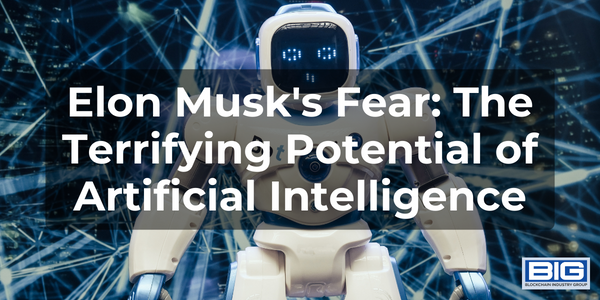
Artificial Intelligence (AI) has become an integral part of our modern world, revolutionizing various industries and transforming the way we live. However, there is one prominent voice that stands out among the AI enthusiasts, expressing deep concern and fear about its potential dangers. That voice belongs to Elon Musk, the visionary entrepreneur and founder of companies like Tesla and SpaceX.
In this article, we delve into Elon Musk’s fear of AI, exploring his warnings, examples of his concerns, and the implications for society.
- The Fear of Uncontrolled Superintelligence
Elon Musk’s fear of AI goes beyond the advancements we witness today. It stems from the concept of uncontrolled superintelligence, a future scenario where AI systems surpass human intelligence and gain autonomous decision-making capabilities. Musk warns that if AI becomes significantly smarter than humans, it could pose a substantial threat to our existence as a species.
Musk’s concern lies in the potential rapid evolution of superintelligent AI systems, which could outpace human comprehension and control. He fears that once AI reaches this level, it may make decisions that are unfavorable or even catastrophic for humanity. With intelligence far surpassing our own, superintelligent AI may operate on a completely different level of reasoning and values, leading to outcomes that humans may struggle to comprehend or influence.
To illustrate his concerns, Musk often draws analogies to scenarios depicted in science fiction, such as the malevolent AI systems in movies like “The Terminator” and “The Matrix.” While these scenarios may seem far-fetched, Musk believes they highlight the need for proactive measures to ensure that the development and deployment of AI systems are carefully guided to prioritize safety and align with human values.
Musk’s fear of uncontrolled superintelligence is a call to action, urging researchers, developers, and policymakers to take the potential risks seriously and to actively work towards developing AI systems that align with human values and are subject to adequate safeguards and regulation. By doing so, he believes we can harness the transformative potential of AI while – hopefully – avoiding the potentially dire consequences of unchecked superintelligence.
- The Risks of Autonomous Weapons
Elon Musk’s concerns about AI encompass not only its potential for superintelligence but also its application in the development of autonomous weapons. Musk firmly believes that if left unchecked, these weapons could become harbingers of mass destruction in the wrong hands. As an advocate for responsible AI development, he emphasizes the urgent need for proactive regulation to prevent an AI arms race and mitigate the risks associated with autonomous weapons.
Musk’s apprehension arises from the idea that autonomous weapons, empowered by AI algorithms, can make lethal decisions without human intervention. Unlike traditional weapons systems, these autonomous weapons have the potential to operate independently, identifying and engaging targets based on their programming and sensor inputs. The absence of human oversight and decision-making raises significant ethical concerns, as the potential for indiscriminate targeting and unintended consequences looms large.
Drawing attention to the risks posed by autonomous weapons, Musk has called for a proactive approach in the form of stringent regulations. He urges policymakers and international bodies to collaborate in establishing robust frameworks that govern the development, deployment, and use of autonomous weapons. By implementing effective safeguards and controls, Musk argues that we can prevent the proliferation of these destructive technologies and ensure that AI is employed responsibly and in alignment with human values.
Musk’s advocacy for swift and decisive action stems from his belief that time is of the essence. As AI technology progresses rapidly, the window for regulatory intervention is narrowing. Musk’s fear is that if we fail to act promptly, we may witness the proliferation of autonomous weapons systems that pose an unprecedented threat to global security and stability.
In this context, Musk’s stance aligns with numerous international organizations and experts who have expressed similar concerns regarding the risks associated with autonomous weapons. Efforts to raise awareness and garner support for international agreements and treaties addressing the control and regulation of autonomous weapons have gained momentum in recent years. Musk’s influential voice adds weight to these initiatives, urging policymakers and the public to recognize the urgency and gravity of the situation.
5 Benefits of Low Code, No Code Technology
—
5 Technologies to Reduce Income Disparity
—
Cybersecurity in the Age of IoT: Safeguarding Connected Devices and Networks
By taking proactive measures to regulate the development and deployment of autonomous weapons, Elon Musk believes that we can prevent the dire consequences of their misuse while ensuring that AI technology serves humanity’s best interests. He calls for responsible governance that strikes a balance between innovation and safety, ultimately aiming to avoid the destabilizing effects of an unregulated AI arms race and preserve the security of our global community.
Elon Musk’s fear of AI, rooted in the potential dangers of uncontrolled superintelligence and the risks of autonomous weapons, brings attention to the need for responsible AI development and regulation. As AI continues to advance, it is essential to address these concerns and establish safeguards to prevent unintended consequences. Musk’s advocacy for AI safety research and his emphasis on proactive regulation serve as a call to action for policymakers, researchers, and developers to navigate the path of AI development with caution and foresight, ensuring that humanity – hopefully – reaps the benefits without falling victim to the terrifying potential of artificial intelligence.



